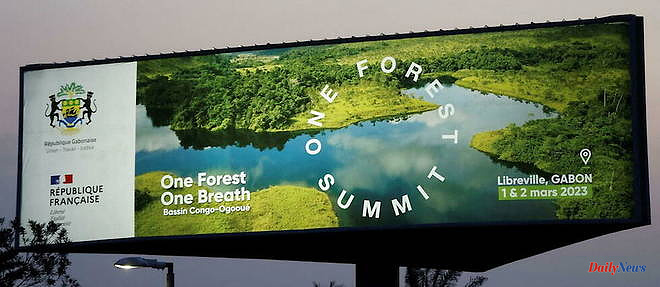It is the "second forest lung" of the planet, after the Amazon. The Congo River Basin forest covers an area of approximately 2 million square kilometers across several countries, with more than 60% in the DRC, and the rest in neighboring countries between Gabon, Congo, Cameroon and the Central African Republic. Like the Amazon, these forests absorb tons of CO2 into their trees and bogs. They are sanctuaries for endangered species, such as forest elephants or great apes. But they are constantly threatened by agricultural, industrial and sometimes oil overexploitation. Their protection is therefore a crucial issue for the whole world.
The sixth edition of the One Forest Summit, which opens this Wednesday, March 1, in Libreville, Gabon, in the presence of French President Emmanuel Macron and his Gabonese counterpart Ali Bongo, will devote a large part of its debates to the efforts to be made. to find solutions in the preservation of the forest basins of the Congo, but also those of Amazonia and Southeast Asia. The Élysée has been campaigning for several years for this event to be held as close as possible to the field, Brazzaville, in Congo had been brought forward a year ago to organize the meeting. The choice finally fell on Libreville on the occasion of the COP27 which was held in Sharm el-Sheikh, last November. "This summit will be a key moment to move forward on climate action and the preservation of biodiversity," says the Elysée.
“Who benefits from the climate business of multiple climate summits to address the same issues? Asks, from the outset, Marc Ona Essangui, on the phone from Libreville. We continue to do greenwashing, bluewashing, without ever posting a balance sheet, or solving the real climate problems, which are erosion, deforestation, problems of exploitation of natural resources, such as oil, mines, etc. . Who does all this benefit? Maybe to the lobbies, because, concretely, I don't see the results, ”he points out.
The environmental defender at the head of the NGO, Brainforest, founded more than twenty years ago, is against the organization on Gabonese soil of the One Forest Summit. “The real concern is the timing, because we are in the middle of an election year and we are coming out of COP27 and COP15. What we remember is the arrival of Emmanuel Macron who comes to dub Ali Bongo, "he continues. What worries the pro-democracy activist even more is the fact that "nobody at the Quai d'Orsay [French foreign ministry] or at the Elysée Palace warned that this timing could pose a problem and especially without taking into account the opinion of the Gabonese". Especially since Gabon entered the Commonwealth organization in 2022 and since, over the past ten years, it has largely turned to new partners, China and India in the lead.
In six months the presidential election will take place in Gabon. Several candidates have already been announced, but not the current head of state, Ali Bongo Ondimba, in office since 2009 and re-elected in 2016. "Nobody can ignore that the arrival of the French head of state alongside Ali Bongo will arouse interpretations. Strategically, the latter did not want to declare himself before the organization of this summit and he takes refuge behind this fact just like the Élysée", regrets Marc Ona Essangui, whose NGO has solid expertise on the issues forests.
"There are fears in the public opinion about the transparency of the next elections and the possibility of the regime resorting again to force to impose itself even if it fails to obtain the majority of the votes at the ballot box, as this was the case in 2016, points out the Gabonese economist and analyst Mays Mouissi. As such, the visit of President Emmanuel Macron will be observed in a particular way by the Gabonese people who expect France to respect the choice they will have expressed at the ballot box and to defend the democratic principles to which it says be attached. Any other attitude of President Macron will have the effect of exacerbating the anti-French feeling that we feel rising in part of the opinion, "warns this expert. “Due to the deterioration of its business environment, Gabon has become less attractive, including for French investors. Over the past 14 years, the number of French people living in Gabon has fallen by 30%, from 10,994 to 7,790. In comparison, over the same period, the number of French people living in Côte d'Ivoire has increased by 44%. »
The success of this summit and the results obtained would, however, be most beneficial for Gabon. Libreville is often rightly praised by the international community for its "exemplary" fight to preserve its biodiversity and fight against global warming. The country was even, in June 2021, the first African country to be rewarded by international funds for its contribution to the absorption of CO2 in the world thanks to its programs to preserve its forest, which covers 90% of its area. territory. And Libreville pleads for the establishment in the world of "biodiversity credits" on the model of carbon credits.
"Logging is, however, the first threat to our forests," notes Marc Ona Essangui. Gabon is not a model of conservation as it claims, especially concerning the allocation of forest permits, he continues. When we look at the rate of allocation of these permits, we see that it is very high and more than 80% of the territory is allocated to logging. Add to that the mining and oil permits, there is no more room for preservation,” he points out. “Can we seek to preserve the forest and at the same time exploit it massively? The fear is great, according to the expert, that those who hold these permits will embark on the exploitation of Gabon's forests and that, as a result, deforestation will accelerate. For the environmental activist, it is necessary to act on several axes, such as the planting of trees in the savannah zones which would make it possible to reinforce the vegetation cover and thus capture carbon. On the other hand, he regrets that primary forests are destroyed to plant oil palms or rubber trees. On another aspect of the problem, Marc Ona Essangui directly implicates "certain operators who are crooked, and very disrespectful of the laws". "We must make the fight against the corruption of public officials a priority", he says again, constant in his fights, despite the blockages of the administration which he denounces regularly.
One of the challenges of this week's summit is to help find innovative sources of finance for the restoration and protection of tropical forests, often through the purchase by companies of carbon credits to offset their CO2 emissions. The French government wants to see private companies more involved and intends to support Gabon in this dynamic. However, argues Marc Ona Essangui, “Libreville is far from the mark since the credit it offers are so-called “sovereign” credits, as they are calculated and issued at the country level, he explains. In this context, the price is considered too expensive by large companies, which prefer credits from forest conservation projects. The credits must also be certified by Verra, a private organization, which Gabon refuses to do, because it prefers to go through the UN organization. »
Complex debates, but which could make the country take off, because the Gabonese forest constitutes a potential for major economic development, while the political and socio-economic context remains tense. “Economically and socially, Gabon's dependence on the primary sector continues to characterize its weakly resilient economy. Despite the significant level of budgetary resources it derives from it, the government of President Ali Bongo Ondimba is unable to ensure a fair redistribution to the populations,” explains Gabonese economist and political scientist Mays Mouissi. Gabon is still largely dependent on oil, which covers 80% of its exports and 45% of its GDP.
Has this proactive environmental policy made it possible to create jobs and what impact does it have on local populations? "According to my observations on the ground, it is the operators, often Chinese or Indians, who come to exploit our forests, who are the big winners, because they employ labor at a lower cost", reacts Marc Ona Essangui, still proud of the many national parks in his country, one of the few in Africa to have managed to preserve its forest massif, due to its dependence on oil.
Mays Mouissi points to "the endemic corruption in the forestry sector and the resulting uncontrolled exploitation", two factors "which ended up sparking a rebellion in the hinterland", he explains. “Villagers regularly see their plantations destroyed by pachyderms whose living environment is reduced due to forestry activity. To make populations accept the constraints imposed on them in the context of the preservation of nature, it is absolutely necessary that they derive an economic benefit from it”, he notes. As such, the government should take a more inclusive approach to environmental decision-making rather than the top-down approach it has favored so far. »












